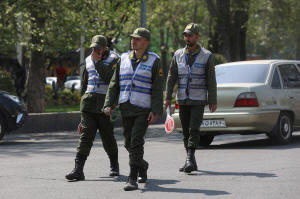Iran's Israel strike coincided with crackdown on dissent at home,
activists say
 Send a link to a friend
Send a link to a friend
 [April 23, 2024]
By Parisa Hafezi [April 23, 2024]
By Parisa Hafezi
DUBAI (Reuters) - The same day Iran launched its first ever direct
attack on Israel it embarked on a less-noticed confrontation at home,
ordering police in several cities to take to the streets to arrest women
accused of flouting its strict Islamic dress code.
Iranian authorities insist that their so-called Nour (Light) campaign
targets businesses and individuals who defy the hijab law, aiming to
respond to demands from devout citizens who are angry about the growing
number of unveiled women in public.
But activists and some politicians say the campaign appears aimed not
only at enforcing mandatory hijab-wearing, but also at discouraging any
wider dissent at a vulnerable moment for the clerical rulers.
Under Iran's sharia, or Islamic law, women are obliged to cover their
hair and wear long, loose-fitting clothes. Offenders face public rebuke,
fines or arrest.
The laws have become a political flashpoint since protests over the
death of a young woman in the custody of the country's "morality police"
in 2022 spiraled into the worst political turmoil since the 1979 Islamic
Revolution.
In a show of civil disobedience, unveiled women have frequently appeared
in public since the death of 22-year-old Mahsa Amini. Security forces
violently put down the subsequent revolt, which called for the
government's downfall.
As Iran's drone and missile assault unfolded on April 13, Tehran Police
chief Abbasali Mohammadian went on state TV to announce the new
campaign.

ARRESTS
"Starting today, Police in Tehran and other cities will carry out
measures against those who violate the hijab law," he said, while
hundreds of police swept onto the streets of the capital and other
cities.
Social media users posted pictures of a heavy morality police presence
in Tehran and videos of police violently arresting women they alleged
were improperly dressed, including plainclothes security forces dragging
young women into police vans.
Morality police vans had largely vanished from the streets since last
year.
The campaign rapidly drew public expressions of unease.
Concerned about what they say could be a deepening rift between the
establishment and society at large, some politicians have criticized the
intensified crackdown.
"... right at a time when national solidarity is more crucial than ever,
the same ugly scenes (witnessed during the protests) are intensifying
with more violence against Iranian women and girls! What kind of policy
is this?," reformist politician Azar Mansouri posted on social media
platform X.
[to top of second column]
|

Iran's police forces walk on a street amid the implementation of the
new hijab surveillance in Tehran, Iran, April 15, 2023. Majid
Asgaripour/WANA (West Asia News Agency) via REUTERS/File Photo

Former Labor minister Ali Rabeie posted on his X account: "I really
don't understand when Iranian people feel good and are proud about
confronting Israel, suddenly a group (of decision makers) push the
society towards confrontation with the establishment?."
Some others suspect the campaign had a political motive.
A human rights activist in Tehran said the move was aimed at
"injecting fear into society to prevent any anti-war protests and
quell domestic dissent when the rulers are at war with Israel".
TOUGHER STANCE
"It is no coincidence that on the very day of the attack on Israel,
police flooded the streets. They were concerned about the resurgence
of unrest," said the activist, who spoke on condition of anonymity
because of the issue's sensitivity.
The prospect of a war with Israel, after a series of tit-for-tat
retaliation between the arch foes, has alarmed many ordinary
Iranians already facing an array of problems, ranging from economic
misery to tightening social and political controls after the
nationwide unrest in 2022-23.
A former moderate government official said the clerical rulers had
adopted a tougher stance against voices calling for political and
social changes, fearing that such views could gain traction at a
time when Iran is under external pressure.
"That is part of the rulers' strategy to consolidate their grip on
power when the country faces threats from its arch enemy Israel,"
said the former official.
An Iranian politician, a former lawmaker, said "it is not just about
cracking down on women who violate the dress code. In the past days,
we have witnessed a clear crackdown on any sign of dissent".
Journalists, lawyers, activists, human rights advocates and students
have been arrested, summoned or faced other measures in the past
days, according to opposition news websites.
Those websites said the primary charge against those arrested was
"inciting public opinion". On April 14, the intelligence unit of
Iran's Revolutionary Guards warned against any pro-Israeli posts by
social media users, state media reported.
(Writing by Parisa Hafezi, Editing by William Maclean)
[© 2024 Thomson Reuters. All rights reserved.]This material
may not be published, broadcast, rewritten or redistributed.
Thompson Reuters is solely responsible for this content.
 |